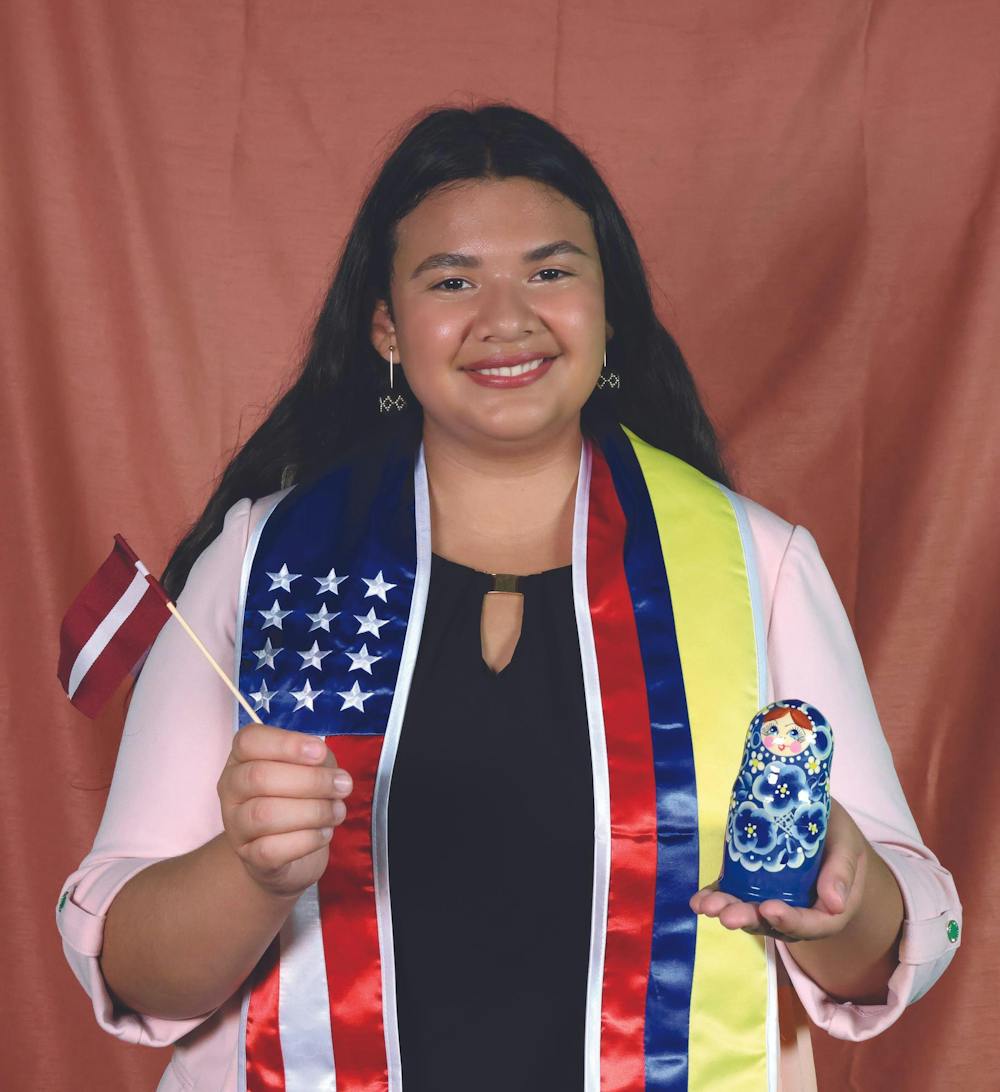Correction: This story has been updated to reflect that Isabella Castro co-authored humanities-based research, and she serves as a peer leader for UF PROMISE.
See all stories published in the 25 under 25 special edition here.
Quadrilingual in Spanish, English, French and Russian, Isabella Castro’s truest fluency is in connection.
Castro, a 20-year-old UF international studies and dual languages junior with a concentration in Europe and specializations in French and Russian, has cultivated language versatility since childhood.
From annual trips to her parents’ hometown in Colombia to serving as their English translator in the U.S., Castro built connections across cultures while witnessing how language differences barred other Hispanic people, like her parents, from doing the same.
“It hurt me,” she said. “They weren’t able to fully say what they wanted to do, because there’s so much nuance in language.”
During high school, Castro also added French to her vocabulary and, throughout her time at UF, Russian — a language the university deems as critical. Critical languages are languages that are nationally valued, yet rarely spoken domestically and typically understudied by Americans.
Her path led her to the 2025 Critical Languages Scholarship, which sent her to Latvia for an immersive program that taught her how language ties into national security and global connection, she said.
In 2025, she also co-authored humanities-based research alongside Armin Langer, a former UF European studies professor. Awarded as an Emerging Scholar, a merit-based scholarship granted to first- and second-year students interested in research with no prior experience, Castro’s research idea became the first ever selected by the Center for Latin American Studies.
Castro and Langer studied resistance in Latin American music, with a focus on the lyrics of rapper Residente. They aimed to understand Pan-Americanism, the movement of alliance across the Americas, alongside broader Latin American history.
“Isabella didn't just comprehend the material,” Langer said. “She applied postcolonial theory and concepts of cultural imperialism to the lyrics with a sophistication that is rare in an undergraduate researcher.”
The Bob Graham Center also honored Castro as a Haskell Scholar, awarding her $2,000
to support a significant research project, which she is using to analyze imagery and political messaging in European far-right campaigns. The Haskell Scholars program recognizes outstanding undergraduate researchers dedicated to public service in both
international contexts.
“She embodies this idea of, there is no harm in applying for everything and anything,” said Corinne Tomasi, academic program coordinator for the Center of European Studies.
Castro has a drive for “looking for the opportunities and not waiting for them to come to her,” Tomasi added.
Even in her spare time, Castro spreads her knowledge in the community. She has taught weekly English lessons for local immigrants during her time as an intern for the Latino Women’s League, a nonprofit organization committed to preserving Latin culture and arts in Gainesville.
She’s also a peer leader for UF Promise, a program for underrepresented or first-generation incoming undergraduates. Supporting others with the resources she once lacked as a first-generation student aligns with her objective to “make it easier for some of the students that come after me,” she said.
“Because we have similar backgrounds being first-gen and I felt that she can understand what I was going through during my first year experience,” said Brian Pham, a 19-year-old health science sophomore and member of Castro’s first mentee group.
As a recipient of the Colonel Glenn A. Farris Scholarship, awarded to exemplary students of Latin American affairs, and the 2025-2027 Obama-Chesky Scholarship for Public Service, granted to 100 rising juniors nationwide, Castro is carving a career of global connection.
Yet, the heart of her mission lies in the intersectionality of it all.
“People can be portrayed sometimes as so divisive and so different, but that does nothing but perpetuate hate,” she said, her voice deliberate with confidence. “It’s so valuable when we can find those inherent similarities.”
In her future, Castro envisions all sorts of careers, like foreign service, government politics or non-profit service. Nevertheless, she is wholeheartedly assured about her desire to foster connection everywhere she goes.
Contact Ariana Badra at abadra@alligator.org. Follow her on X @arianavbm. Póngase en contacto con Ariana Badra en abadra@alligator.org. Síguela en X @arianavbm.
Ariana is a first-year journalism major and an El Caimán reporter for the Fall of 2025. In her free time, she enjoys reading, spending time with friends and scouring for new songs to play on repeat to an absurd degree.






